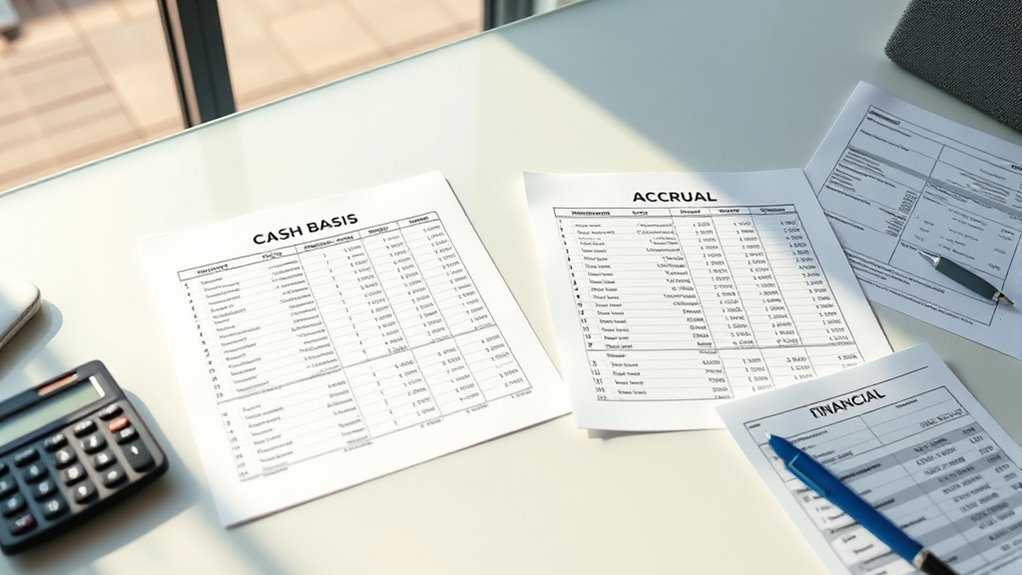If you want to lower your taxes, cash-basis accounting might be better because you recognize income only when you receive cash and can delay invoicing or expenses until later. This gives you more control over when you pay taxes. Accrual accounting, on the other hand, records income when earned and expenses when incurred, which can lead to higher current taxes. To understand which method suits your business best and how to optimize your tax strategy, keep exploring more details.
Key Takeaways
- Cash basis allows deferring income and accelerating expenses, potentially lowering current-year taxable income more easily.
- Accrual accounting may recognize more income upfront, possibly resulting in higher current taxes but better matching of revenue and expenses.
- Small businesses often benefit tax-wise from cash basis due to its simplicity and flexibility in timing income and deductions.
- The choice depends on business size, inventory needs, and whether delaying income or accelerating expenses aligns with tax strategies.
- Understanding each method’s impact on income recognition timing helps optimize tax savings tailored to your business situation.
How Cash Basis Accounting Can Delay Tax Payments

Cash basis accounting can effectively delay tax payments because you recognize income only when you actually receive the funds. This flexibility helps you manage your tax liability by controlling when income is reported. For example, delaying billing or invoicing until after year-end can shift income to the next tax year. Proper inventory management becomes essential, as holding inventory longer can defer income recognition. Additionally, depreciation strategies play a role; by timing asset depreciation, you can reduce taxable income in high-earning years. Prepaying expenses like rent or insurance before year-end also provides immediate deductions, lowering current-year taxable income. Moreover, understanding how inventory management impacts income recognition is crucial for effective tax planning. Overall, cash basis accounting gives you control over when income and deductions are recognized, helping you optimize your tax payments strategically.
The Impact of Revenue Recognition Timing on Tax Liability

Changes in revenue recognition timing under new accounting standards can markedly impact your tax liability. These shifts affect how and when income is reported, leading to significant tax implications. Consider these key points:
- Revenue timing differences between financial statements and tax returns can create temporary disparities.
- Early recognition of revenue for book purposes may result in deferred tax liabilities.
- Delayed revenue recognition can lower current taxes but increase future tax obligations.
- Changes in revenue recognition might require updates to your tax methods or filings (e.g., Form 3115).
- Tax regulations provide guidance on how deferred revenue should be treated for tax purposes, influencing your overall tax planning strategy.
Understanding how revenue timing affects taxable income helps you plan better and avoid surprises. Accurate revenue recognition ensures consistent financial and tax reporting, minimizing unexpected tax liabilities and optimizing your tax strategy.
Tax Planning Opportunities With Cash vs. Accrual Methods

Understanding how revenue recognition timing impacts your tax liability highlights the importance of selecting the right accounting method. With cash basis, you can manage your taxes through inventory management by delaying invoicing until after year-end, deferring income. Accelerating expense payments in the current year boosts deductible expenses, lowering taxable income. Your choice also influences depreciation methods; cash basis often limits deductions to paid expenses, while accrual allows for more strategic depreciation timing. This flexibility helps you align expenses with income, optimizing tax outcomes. Additionally, cash basis accounting generally offers greater control over the timing of income and deductions, which can be advantageous for tax planning. For businesses with complex inventory or receivables, understanding how inventory tracking differs between methods is crucial for accurate tax reporting.
How Business Size and Type Influence Tax Benefits of Each Method

How does your business’s size and type influence the choice between cash-basis and accrual accounting? If you’re a small business, cash basis offers simplicity, tax control, and benefits for inventory management and business growth. Smaller businesses often find cash basis more manageable for ease and tax flexibility, especially when cash flow is a primary concern. Larger or expanding businesses often need accrual accounting to meet GAAP standards and accurately reflect financial health. Consider these points:
- Small businesses with straightforward operations prefer cash basis for ease and tax flexibility.
- Inventory-based businesses, like retail or manufacturing, often require accrual to match revenue with inventory costs.
- Growing businesses benefit from accrual to support external financing and provide a clear financial picture.
- Service providers with fewer inventory concerns lean toward cash basis for its simplicity and cash flow management.
- Additionally, recent tax thresholds under the TCJA have expanded eligibility for small businesses to use cash accounting, making it an attractive option for many.This expansion makes cash basis accounting more accessible to a broader range of small businesses, especially those approaching the thresholds. Your business size and type directly impact the tax benefits and suitability of each method.
Managing Cash Flow and Tax Strategies Under Different Accounting Systems

Choosing the right accounting system considerably impacts how you manage your cash flow and implement tax strategies. With cash-basis accounting, you can control income and expense timing, aiding inventory management and optimizing financial ratios. Deferring income by postponing invoices or accelerating expenses before year-end lowers current tax liabilities, improving cash flow. This flexibility allows you to align tax payments with cash availability, reducing cash flow strain. Conversely, accrual accounting provides a clearer picture of your financial health by matching revenues with expenses, but limits timing flexibility for tax planning. Recognizing income when earned and expenses when incurred can lead to higher taxable income, affecting cash flow. Additionally, understanding the differences between cash and accrual accounting can help you choose the most advantageous system for your business needs. Selecting the appropriate system depends on balancing your cash flow needs with your desire for accurate financial reporting and strategic tax management.
Frequently Asked Questions
Can Small Businesses Legally Choose Between Cash and Accrual Accounting?
You can choose between cash and accrual accounting if you’re a small business, but your eligibility depends on factors like gross receipts and inventory. Your choice impacts tax planning and cash flow, so pick the method that aligns best with your financial situation. Remember, once you decide, you need IRS approval to switch, and using the right method helps manage your taxes and improves cash management strategies.
How Do Inventory Requirements Affect the Choice of Accounting Method for Tax Purposes?
You might think that avoiding inventory management complexities simplifies your taxes, but in reality, inventory requirements heavily influence your accounting method choice. Accrual accounting tracks inventory costs and recognizes revenue when earned, aiding tax planning and providing a clearer financial picture. If your business holds inventory, using accrual often becomes mandatory, ensuring accurate reporting and compliance, which can ultimately impact your taxable income and benefits.
What Are the IRS Thresholds for Mandatory Accrual Accounting?
You need to know that IRS thresholds determine when you must switch to accrual accounting for tax reporting and financial statements. Currently, if your average gross receipts over three years stay below $30 million, you can use cash basis. Exceeding this amount generally requires you to adopt accrual accounting, especially if you deal with inventory or are ineligible for exemptions. Staying within thresholds helps keep your tax reporting compliant and simplifies financial statements.
How Does Each Method Impact Financial Statement GAAP Compliance?
They say, “The devil is in the details,” and this holds true for financial statements. Your choice of accounting method impacts GAAP compliance by affecting revenue recognition and financial statement presentation. Accrual accounting aligns with GAAP, providing accurate, consistent, and exhaustive reports. Cash-basis, however, can distort financials and isn’t GAAP-compliant, leading to less reliable statements. For transparent, comparable financials, accrual is the clear choice.
Are There Specific Industries That Benefit More From Cash or Accrual Accounting?
You’ll find that industry-specific accounting methods suit different needs. For example, small service businesses or freelancers benefit from cash basis accounting because it aligns with seasonal sales patterns and simplifies tracking income. Conversely, manufacturing or retail industries often prefer accrual accounting to manage inventory and long-term projects. Recognizing these industry nuances helps you choose the right approach to improve financial clarity and meet industry standards effectively.
Conclusion
Picture yourself steering your business through a river’s gentle bends, choosing between the steady current of cash basis or the deeper waters of accrual. Each path offers different views of your taxes—some smoother, others more strategic. By understanding these flows, you can navigate toward lower taxes and better cash flow. Whichever route you take, arming yourself with knowledge lets you steer confidently, turning financial challenges into opportunities that keep your business sailing smoothly ahead.









